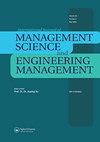运用主客观模型评价运输企业的效率
IF 3
Q2 OPERATIONS RESEARCH & MANAGEMENT SCIENCE
International Journal of Management Science and Engineering Management
Pub Date : 2022-07-19
DOI:10.1080/17509653.2022.2101153
引用次数: 2
摘要
本文章由计算机程序翻译,如有差异,请以英文原文为准。
Evaluating the efficiency of a transport company applying an objective-subjective model
ABSTRACT The main goal of every company is to gain as much profit as possible, and a very important goal is also to obtain a competitive advantage in the market. In this paper, it has been developed and applied an integrated model, which is based on a PCA-DEA-MCDM approach, with the aim of evaluating the efficiency of a transport company from Bosnia and Herzegovina. At the very beginning, using the PCA (Principal Component Analysis)–DEA (Data Envelopment Analysis) model, efficient and inefficient business years were identified, and then, using CRITIC (Criteria Importance Through Inter Criteria Correlation) and the Entropy method, weight values of defined parameters were determined. After that, the decision-making units were ranked using MARCOS (Measurement Alternatives and Ranking according to the Compromise Solution). In addition, the sensitivity analysis includes the formation of scenarios of changes in weight values of five most significant criteria and the calculation of SCC and WS correlation coefficients. The application of this integrated model, in addition to identifying efficient/inefficient years of operation, enables the identification of influencing factors of the most efficient year of operation, which can serve as a benchmark to further contribute to the efficiency of the transport company.
求助全文
通过发布文献求助,成功后即可免费获取论文全文。
去求助
来源期刊

International Journal of Management Science and Engineering Management
OPERATIONS RESEARCH & MANAGEMENT SCIENCE-
CiteScore
8.50
自引率
33.30%
发文量
40
期刊介绍:
International Journal of Management Science and Engineering Management (IJMSEM) is a peer-reviewed quarterly journal that provides an international forum for researchers and practitioners of management science and engineering management. The journal focuses on identifying problems in the field, and using innovative management theories and new management methods to provide solutions. IJMSEM is committed to providing a platform for researchers and practitioners of management science and engineering management to share experiences and communicate ideas. Articles published in IJMSEM contain fresh information and approaches. They provide key information that will contribute to new scientific inquiries and improve competency, efficiency, and productivity in the field. IJMSEM focuses on the following: 1. identifying Management Science problems in engineering; 2. using management theory and methods to solve above problems innovatively and effectively; 3. developing new management theory and method to the newly emerged management issues in engineering; IJMSEM prefers papers with practical background, clear problem description, understandable physical and mathematical model, physical model with practical significance and theoretical framework, operable algorithm and successful practical applications. IJMSEM also takes into account management papers of original contributions in one or several aspects of these elements.
 求助内容:
求助内容: 应助结果提醒方式:
应助结果提醒方式:


